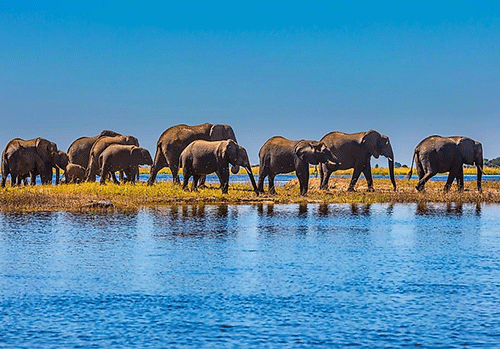The 22 elephants captured from the Kamanjab commercial farming area in the Kunene region and exported to the United Arab Emirates in a private transaction, have arrived safely in the Middle East nation.
As an intervention to the increasing cases of human-wildlife conflict, particularly those involving elephants, the environment and tourism ministry has auctioned and supplied 37 elephants to the successful bidders, including GH Odendaal.
From 2019 to 2021, the country recorded a total of 960 cases of crop damages, of which 923 were caused by elephants.
The majority of people in communal areas depend on small crop farming for their survival, where any disruption affects them severely.
Unfortunately, four lives were lost within the same period as a result of marauding elephants, and the ministry has paid N$13.9 million since to offset losses to those affected.
This was revealed by the environment and tourism ministry’s spokesperson Romeo Muyunda, who confirmed that the elephants arrived early Saturday morning and are reportedly doing well, except some which were seemingly weak. “We want to clarify that all the auctioned elephants were sold to Namibian bidders. The exporting of elephants out of Namibia was not the ministry’s decision,” he stated.
Furthermore, he said once the successful bidders have ownership of the elephants, they are within their rights to utilise them any way, provided it’s done within the confinement of domestic and international laws.
With the export of the 22 elephants, no international or domestic laws were violated by either the importing state or exporting state. He explained that all relevant permits, including CITES permits, were obtained.
“Namibia respects the rule of law without the need to compromise. The ministry received condemnation and criticism for our decisions to auction some elephants from areas that are prone to human or elephant conflicts. We understand the roles of animal rights groups and other wildlife organisations. However, the decisions the ministry makes with regards to wildlife are part of the bigger picture of conservation in the country, and in line with our mandate as provided for in article 95 (l) of the Namibian constitution,” he noted. According to him, the ministry has a huge responsibility and pressure that comes with managing human-wildlife conflict in a way that balances the rights of the people and the need for conservation.
Muyunda lashed out that most of their critics fail to recognise that Namibia’s conservation has been a success because people have accepted to co-exist with animals.
However, this co-existence is currently threatened by the ever-increasing cases of human-wildlife conflict. “We would not want to imagine what would happen when people no longer accept sharing living space with wild animals. Instead of condemning us, animal rights groups, which are in any case based in countries without wild animals, must be grateful to countries like Namibia that take practical decisions to enhance conservation,” he added.
The ministry reiterated that its primary objective with the auction was to reduce elephant numbers in those areas to give relief to affected communities.
Muyunda said the funds generated, on the other hand, will be invested in conserving wildlife, particularly in the management of human-wildlife conflict, and not necessarily be pocketed by individuals as insinuated by animal rights groups.
He gave the assurance that the Game Products Trust Fund’s accounts where the proceeds are deposited are audited against financial mismanagement.
The ministry thus called upon those who have alternative solutions to minimising or managing human-wildlife conflict to make proposals to the ministry for consideration.
“We have noticed during the auction process of offers made, but not in line with the auction requirements. Human-wildlife conflict is continuous; the ministry remains open for consultations,” he continued.
–anakale@nepc.com.na


